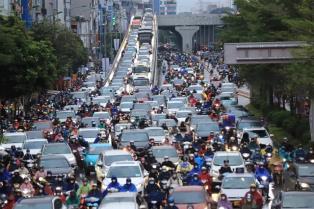Vietnamese automotive manufacturer VinFast made the global debut of its new electric vehicles VF e35 and VF e36 at the Los Angeles Auto Show 2021 in California, the US.

Domestic e-vehicles will consume about 71.87 billion kWh by 2050 when the whole population will use 100 per cent e-bikes and 70 per cent e-automobiles, according to experts.
The comments were made during a seminar to discuss the future of e-vehicle development in Viet Nam held yesterday in Ha Noi.
Energy expert Nguyen Quoc Khanh said the consumption was equivalent to 10 times the output of the Hoa Binh hydropower plant.
He said in the 2014-2020 period, some 5.14 million motorbikes and 255,000 cars were registered. Of this figure, the energy consumption for the traffic sector accounted for 21.4 per cent of the country’s total energy consumption in 2014, or an increase of 4.9 per cent between 2014-19. The emissions totalled 33.2 million tonnes, or 19.3 per cent of the country’s energy sector.
During the seminar, Khanh outlined three main scenarios for e-vehicle development.
In the first scenario, the number e-motorbikes will be low, mainly focusing on e-motorbikes with 18 per cent by 2030 and 40 per cent by 2050.
For the second scenario, the ratio of e-motorbikes will account for 34 per cent by 2030 and 65 per cent by 2050. And e-automobiles will account for 30 per cent by 2030; 70 per cent by 2050; e-buses 10 per cent by 2030; 30 per cent by 2050 and medium and light trucks will account for five per cent by 2030 and 30 per cent by 2050.
Khanh said with such scenarios, the power consumption demand will be huge. Of which, the electricity consumption for the transport sector will reach 3.99 billion kWh by 2030. This figure will reach 17.57 billion kWh by 2050.
Electric and battery safety is a must
Nguyen Duc Tuyen of the University of Science and Technology said apart from Viet Nam’s automotive manufacturer (Vinfast)'s 200 charging stations, there was no infrastructure for e-vehicle development in Viet Nam. Vietnamese standards for the development of e-vehicles were not available.
To promote the development of e-vehicles in Viet Nam, it was essential to complete technical standards relating to electric safety for fast charging stations and battery systems. In addition, the Government needed to offer incentives for purchasing prices, charging costs, installation of charging stations and tariffs on high carbon emissions. Private e-vehicle lanes should also be developed, said Tuyen.
Sharing Tuyen’s view, Tran Quang Ha of the Ministry of Transport said that electrical and battery safety was a must for e-vehicles.
The country has worked out a plan to develop a battery standard by 2022. To invest and conduct testing in line with international standards is a problem, involving technical factors such as vibrations and the environment, according to industry insiders. — VNS





